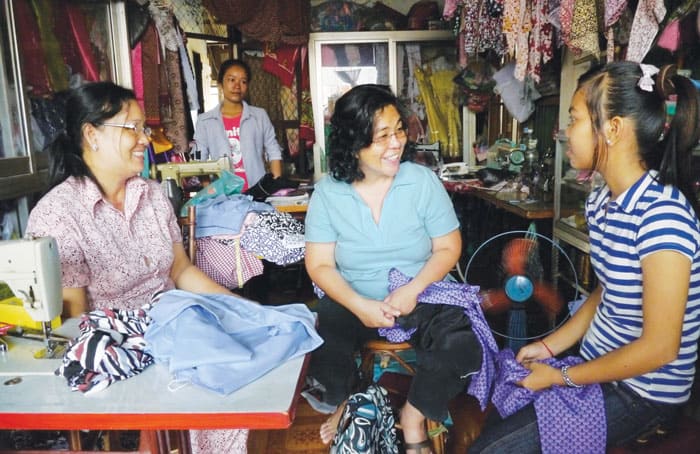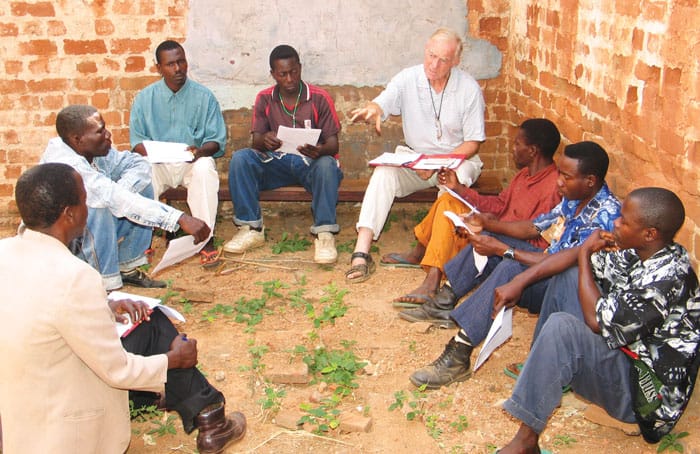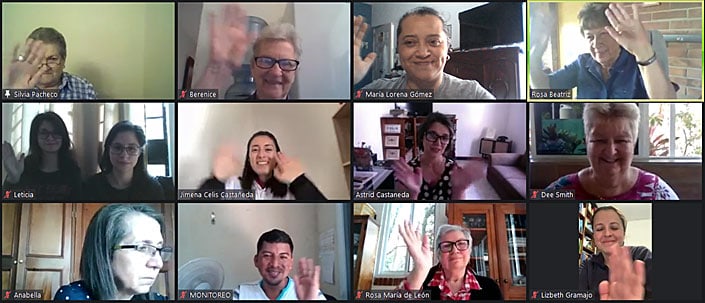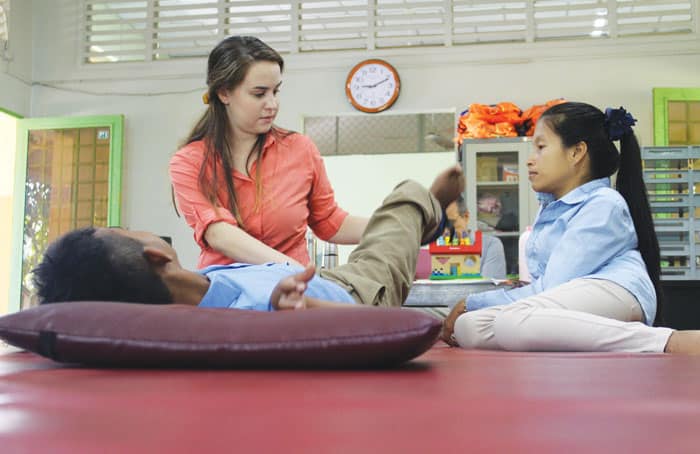Missioners listen, dialogue and discern together in the worldwide synodal process.
An African proverb says, “If you want to walk fast, walk alone. If you want to walk far, walk together.”
This proverb, sometimes cited by Pope Francis, reflects his call to “journey together” through the Synod 2021-2024. The three-year process is centered around synodality, the style of being a Church that listens to the Holy Spirit — and each other.
Unlike previous synods, this process invited all Catholics to participate in a worldwide consultation, emphasizing that there is a place for everyone in the Church. With regional listening sessions already held, discernment is now taking place on the continental level. The process will culminate at synod meetings of Church leaders and delegates in October 2023 and October 2024 in Rome.
Pope Francis teaches that the mission of the Church requires the entire People of God to walk together, with each member playing a crucial role. “In the Church, all of us are called to be missionary disciples and to make our own contribution,” he says.
Maryknoll has participated in the synod process in many ways.
One way was through zoom meetings that congregated 125 members of the Maryknoll Society, Sisters, Lay Missioners and Affiliates. The meetings energized participants, who live out their baptismal vocation to mission in different ways, encouraging them to walk together more intentionally as one Maryknoll movement.
The meetings were led by the Committee of 12, a self-organized group of missioners from each Maryknoll expression: three Maryknoll priests, three sisters, three lay missioners and three affiliates. Many of them had been or are currently in leadership positions in Maryknoll. The 12 began meeting by zoom every other week in 2020 “to learn from one another and to see where we can cooperate with one another, and to really listen to everyone,” explains Maryknoll Sister Ellen McDonald.

Maryknoll Sister Montiel visits people in Cambodia as part of Seedling of Hope, a program to provide support to people living with HIV and their families. (Sean Sprague/Cambodia)
By getting to know each other more deeply, listening to each other’s challenges and hopes, and praying together, the group of laypeople, priests and sisters was inspired to share this synodal impetus with others.
Maryknoll missioners, who have been walking alongside people in need in Africa, Asia and Latin America for over 100 years, are well-versed in the joys and struggles of synodality in mission. The synodal discussions affirmed the various gifts that come from living among, listening to and collaborating with people at the margins. “I often say I was in mission with local people (in East Africa) who were missioners themselves,” says Maryknoll Father Kenneth Thesing, who approached Maryknoll Sister Claudette LaVerdiere to create the Committee of 12.
This approach to mission impacts — and empowers — the people the missioners accompany. Sister McDonald still remembers an indigenous woman in the altiplano of Peru saying, “Before Maryknoll came, we walked bent over, but now we know how to stand tall, because we know that we are the Church.”
For missioners, relationship building “starts with vulnerability,” says Robert Short, executive coordinator of the Maryknoll Affiliates, who was a lay missioner in Bolivia and Ecuador. “You’re in a new country with a new language and a new culture, new food and everything is new. You feel vulnerable. But to embrace that is a good thing. It helped me connect with the people.”
“If we want to be in solidarity with people on the margins, we have to get to know who we are in solidarity with,” says Kylene Fremling, a Maryknoll lay missioner who works at a school for children with physical disabilities in Cambodia. “The more we hear from the people and their experiences, (the more) we are transformed.”

In Mozambique in 2004, Maryknoll Father Thesing converses with leaders of small worship communities. Missioners value listening and dialogue. (Mark Gruenke, Maryknoll Mission Archives)
Helping with listening sessions in their parishes, dioceses and vicariates worldwide is another way Maryknollers have been part of the synodal process. Short says this includes many of the 45 Maryknoll affiliate chapters in the United States, Latin America, East Africa and Asia.
Nairobi-based Maryknoll Father Joseph Healey, who belongs to international groups engaging with the synodal process, says that flourishing Small Christian Communities in East Africa already express synodality in action. A Catholic sister from Tanzania once told him, “This is our way of life,” and she added, “We’re community people.”
Father Healey and other Maryknollers also help to conduct listening sessions with groups of young adults in the States as well as in East Africa. In Kenya, he works with Alloys Nyakundi, who facilitates Young Adult Seekers Small Christian Communities discussions online.
Like other entities participating in the synod process, the meeting of the 125 Maryknoll participants yielded a synthesis document. After consulting participants on the document’s contents, the synthesis was shared with the leadership of each Maryknoll expression and then sent to the Synod’s office in Rome.

The document emphasized common concerns for the world, such as “urgency of the joint needs of the earth and the poor, especially migrants and other displaced persons, racism and critical modes of violence.”
It also reaffirmed the preferential option for those in the margins that Jesus showed in the Gospels. This option calls for the full participation of all and “it raises up what the Holy Spirit is saying in the lives of people throughout the world.”
Father Healey foresees the impact of the Synod 2021-2024 on two levels: diocesan and national. He believes the findings will lead to ways in which dioceses can reinvigorate or re-energize parishes. And, after the meetings in Rome, delegates will go back to their countries to further discuss steps. Deep listening to people’s concerns, pains and hopes, as well as their experiences with the Church — especially those who don’t usually have a voice — is the beginning of synodality.
Maryknoll Sister Maria Leonor Montiel spent 20 years in Cambodia, where Maryknoll has a rich history of collaboration among society members, sisters and laypeople. She hopes that the worldwide synodal process “renews the Church in such a way that it would also draw in the people who have questions and have been disillusioned and have left the institutional Church” as well as “those who feel discriminated against.”

“Synodality is … largely focused on community and relationship building,” says Fremling, who has served in Cambodia since 2018. “We have to listen to each other and see what other voices we need to include in conversations and how we deepen all of those relationships.”
Maryknoll Father John Sivalon adds that no matter what happens at the upcoming Synod gatherings in Rome, the spirit of synodality (the process of being Church by listening to all voices as we walk together) has been ignited.
While the continental phase of the worldwide synodal process carries on, Maryknollers continue to discern how to go forth on a more collaborative path. One concrete way is forming small intentional mission communities, whether in person or virtual. The groups strengthen their bonds through deep listening, contemplative prayer and collective action.
Featured image: Several members of the Committee of 12, (from left) Maryknoll Lay Missioner Marj Humphrey, Maryknoll Sister Ellen McDonald, Maryknoll Father John Sivalon, Maryknoll Sister Leonor Montiel, Maryknoll Father Kenneth Thesing and Maryknoll Sister Claudette LaVerdiere, walk together at the Maryknoll Sisters Center in Ossining, New York. (Maria-Pia Negro Chin/U.S.)
![]()

